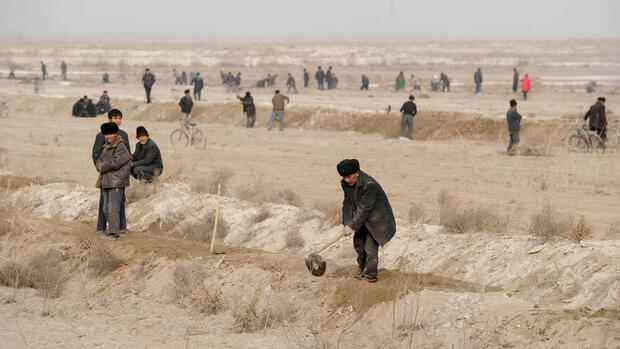The suppression of the Uyghurs in China is one of the triggers for the new regulation against forced labor.
(Photo: imago images/Joerg Boethling)
Berlin, Brussels European companies will have to scrutinize their supply chains even more intensively: The EU Commission wants to ban all goods that were created using forced labor from the internal market. The far-reaching ban, which will be announced on Tuesday, affects both imports and exports. It applies to all goods for which forced labor can be proven at any stage of production.
“The fact that there is still forced labor illustrates the need for additional measures aimed at products,” says the Commission’s draft, which is available to the Handelsblatt. This is not an EU directive, but a regulation. This does not first have to be transposed into national law by the member states, but applies directly.
Unlike the US law against forced labor, which went into effect in June, the EU regulation does not explicitly target China. Brussels wants to avoid complaints before the World Trade Organization. Nevertheless, Beijing is likely to see the move as an unfriendly act, after all it will affect countless companies.
There are 28 million forced laborers worldwide
According to the UN, hundreds of thousands of Uyghurs and other members of Muslim minorities are being forced to work in camps in the western Chinese province of Xinjiang alone. The International Labor Organization (ILO) estimates that there are 28 million forced laborers worldwide.
Top jobs of the day
Find the best jobs now and
be notified by email.
The Commission’s initiative was welcomed in the European Parliament. “The EU is finally using its market power to put a stop to forced labor in our supply chains,” said Internal Market Committee Chair Anna Cavazzini (Greens). The Chairman of the Trade Committee, Bernd Lange (SPD), was also satisfied: “You can build on that.” The EU Commission has learned from the “very limited and overly politicized US initiatives”. The regulation is “country-neutral, risk-based and comprehensible”.
>> Also read here: Dirty solar raw materials – May Germany import what the Reject US?
However, MEPs still see room for improvement. The Commission’s proposal does not put the burden of proof on the companies, but on the authorities, Cavazzini said. One must ensure “that authorities do not have to check themselves dead to prove forced labor”.
The ban should be enforced by the national authorities. Among other things, customs should intercept suspicious products at the external borders. Exactly how this is supposed to happen is still unclear. “The question of circumvention options must certainly still be examined,” said Lange.
Warnings came from the economy against too much bureaucracy. Forced labor is a clear no-go, said Peter Adrian, President of the Association of German Chambers of Industry and Commerce (DIHK). “Instead of burdening companies with overly bureaucratic trade rules in these times of foreign trade crisis, the EU should give concrete support to the enormous efforts made by business in the area of sustainability and due diligence.”
The EU Commission is intensifying the fight against forced labour.
(Photo: AP)
He advocated the conclusion of further trade agreements in which sustainability goals could be laid down with legal certainty.
German supply chain law will come into force in 2023
The federal government had already passed a supply chain law in 2021, which, from 2023, obliges companies, with penalties, to control their own value chain right down to the suppliers in such a way that human rights are respected. The Federal Office for Economics and Export Control (BAFA), which reports to the Ministry of Economic Affairs, is responsible for the control.
Depending on how strictly the law is controlled, it poses major challenges for companies with production in China. Because reports from human rights organizations show that forced laborers are not only used in Xinjiang, but in companies throughout China. The problem: Independent controls, especially for Chinese suppliers, are de facto impossible in the People’s Republic.
The US law is significantly stricter than the European or German regulation. Because it assumes that all products that come from Xinjiang were made with forced labor. Since then, customs are no longer allowed to let goods into the USA that were produced in whole or in part in the province.
Companies that purchase products or preliminary products from China were very unsettled by the law because they did not know how to prove that their products were fully compliant with the requirements. It is unclear to what extent the new US rule is already having an effect. Recently, more than two dozen Republican members of the US House of Representatives called for a report from US Customs on the implementation of the law.
More: UN report sees possible crimes against humanity in Xinjiang
